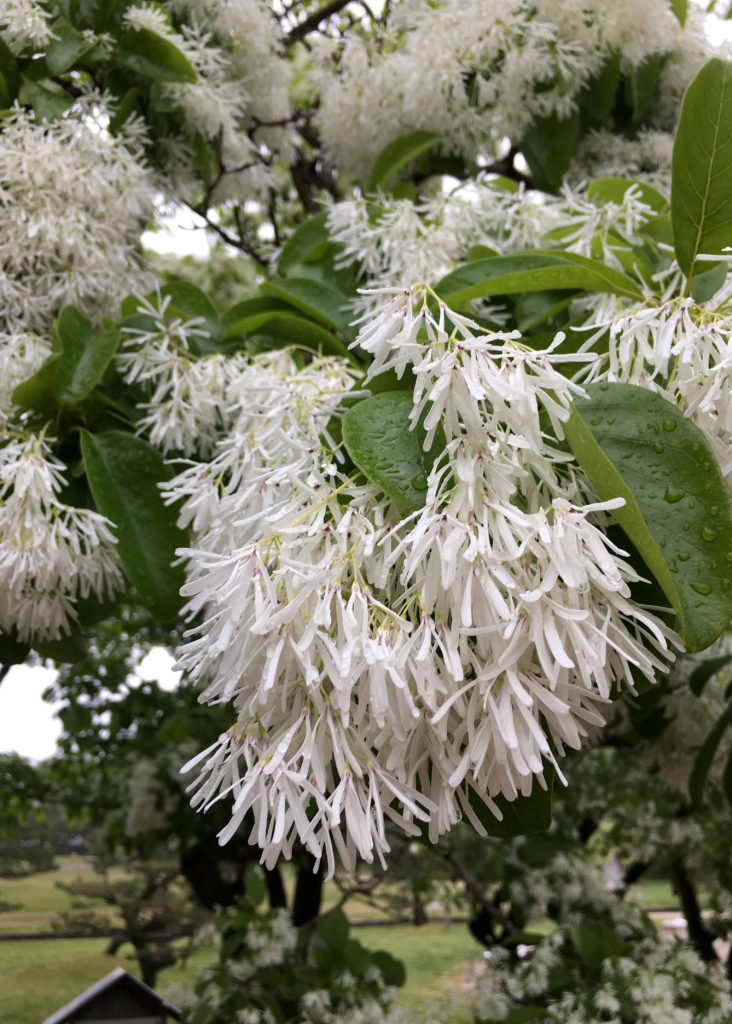
From its name, it’s already an unusual tree, and its flowers are also unique. The flowers bloom around May, and each individual flower is a slender, four-petaled, pure white blossom. However, as you can see in the photo, when they bloom in clusters, they resemble the shide paper streamers used in Shinto rituals. It’s commonly known as “Nanjamonja,” but its official name is “Hitotsubatago.” Both names, “Nanjamonja” and “Hitotsubatago,” are quite unusual. The name “Hitotsubatago” comes from the fact that the shape of the tree resembles a Tago (Toneriko), but unlike the compound leaves of Tago, it has single leaves. So it was named after the single leaf of Tago. On the other hand, the alternate name “Nanjamonja” is like saying in the Kansai dialect, “Nanchu monja? (What kind of thing is this?)” It’s believed that it came to be called that because it was seen as a strange tree with an unknown name. The “Nanjamonja” is a deciduous broadleaf tree of the family Magnoliaceae and is an endangered species that only grows in limited areas such as Inuyama City in Aichi Prefecture, the Tsushima Islands, and the border between Gifu and Nagano Prefectures. However, there is a famous “Nanjamonja” in the Meiji Shrine Outer Gardens. The current one is the third generation, but the first generation, said to be over a hundred years old, was designated as a natural monument in the Taisho era. The “Nanjamonja” in the photo was taken near Matsue Castle in Shimane Prefecture, and recently, it can be seen as street trees here and there.”
名前からして変な木ですが、花も変わっています。5月前後に咲く花ですが、一つ一つの花は真っ白で細長い4弁の普通の花です。しかし、写真で見ての通り、群れて咲くと、まるで神主さんがお祓いで使う御幣のようです。俗に「ナンジャモンジャ」といいますが、正式名は「ヒトツバタゴ」。「ナンジャモンジャ」という名前も変ですが、「ヒトツバタゴ」も変わった名前です。「ヒトツバタゴ」の名前は 、木の形状がタゴ(トネリコ)の木に似ていて、タゴの複葉 に 対 し て 単 葉 で あ る こ と か ら、 一 つの 葉 の タ ゴの 意 味 で 名 付 け られ た と 言 わ れ て います。また、別名「ナンジャモンジャ」は、関西弁でいうならば、この木は「何ちゅう物(もん)じゃ」というところでしょうか。名前のわからない変な木だなというところから、そう呼ぶようになったのでしょう。「ナンジャモンジャ」はモクセイ科の落葉広葉樹で、日本では愛知県犬山市、対馬列島、岐阜と長野の県境など極限られた地域にしか自生しない絶滅危惧種です。とは言っても、明治神宮外苑には有名な「ナンジャモンジャ」があり、今は三代目ですが、樹齢百数十年とされた初代は大正時代に天然記念物の指定を受けたものがありました。写真の「ナンジャモンジャ」も島根県の松江城近くで撮ったもので、最近は、街路樹としてあちらこちらで見受けます。
